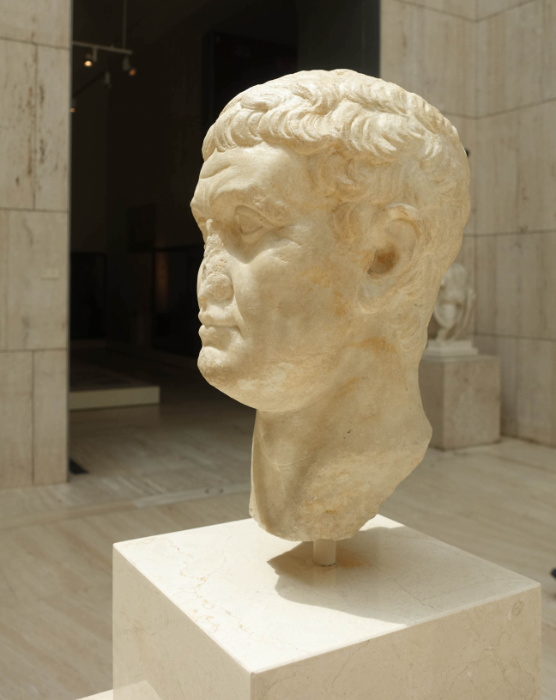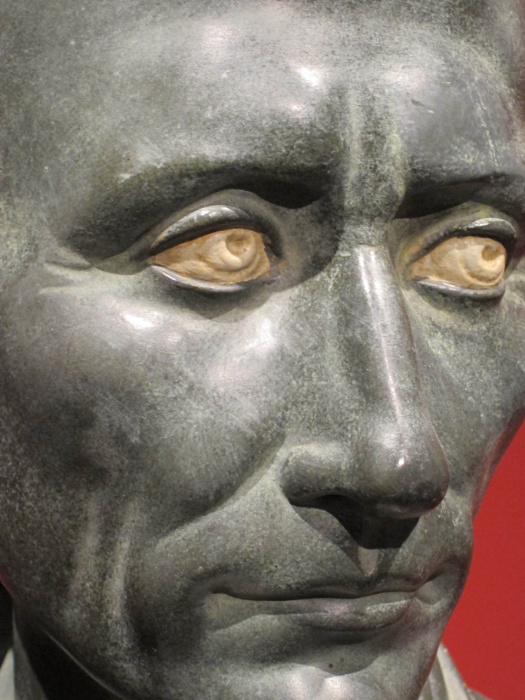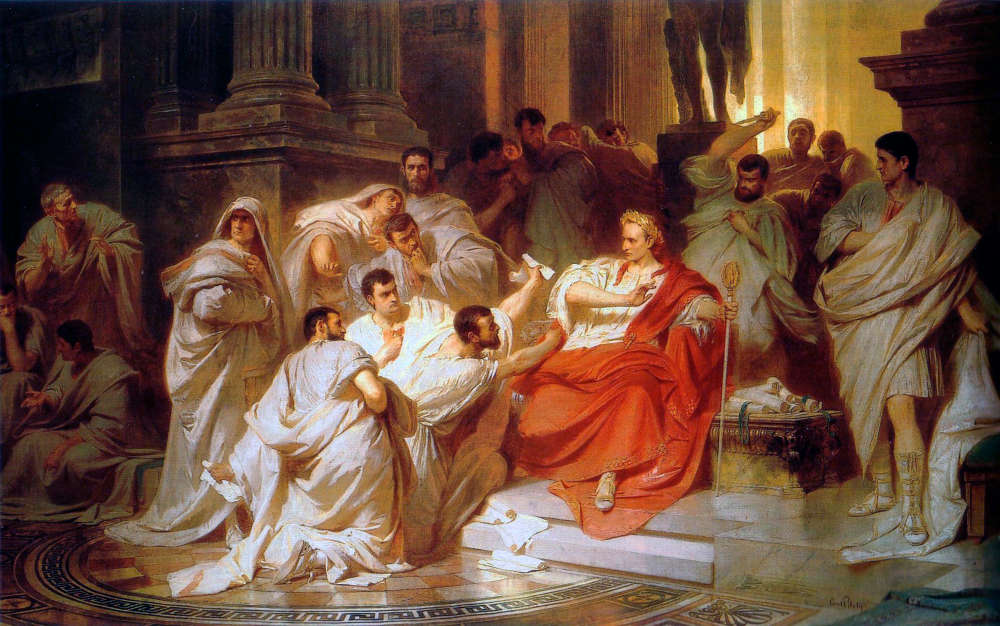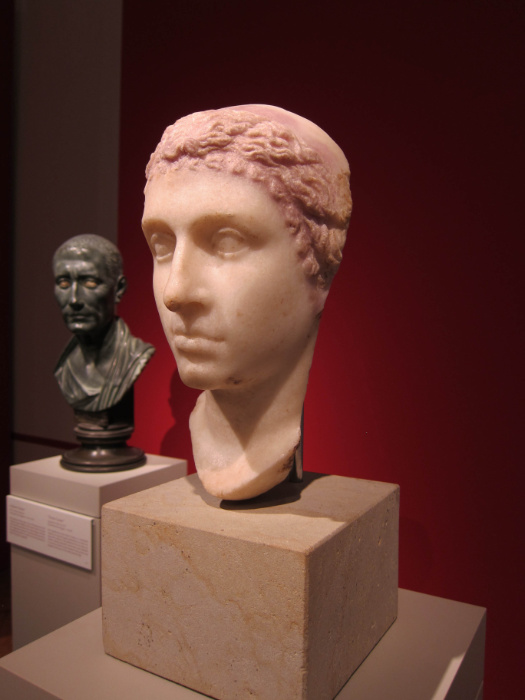Marcus Antonius: The Loser Who Did Not Write History
by Ursula Kampmann on behalf of Künker
It is an old story that we are all familiar with. And yet new versions of it can be told again and again. After all, it is a problem that every politician has to deal with: How do you get the people on your side? Do they value freedom more than security and their daily bread? To whom will history assign the role of “good”, who will be seen as evil – and why? Every historian will have their own answers. Therefore, enjoy this version of the story of Marcus Antonius, the man who began as a loyal follower of Caesar and rose to rule half the world before his ally betrayed and destroyed him.
Content
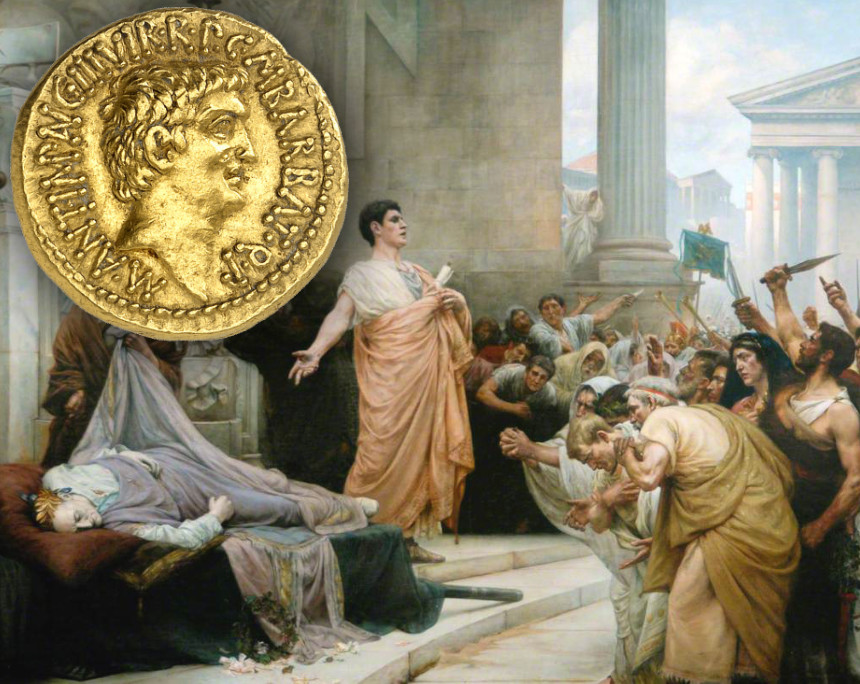
How the great moment of Marcus Antonius was imagined in the 19th century: his famous speech at Caesar’s funeral, painted by George Edward Robertson, 1864. Coin: Obverse of Marcus Antonius and Octavianus. Aureus, 41 BC, Ephesus. From a collection completed before 1990. Very rare. Very fine + / very fine. Estimate: 12,500 euros. From auction 419 (17 March 2025), No. 342.
The Offspring of a Noble Family
Marcus Antonius was born on 14 January, either in 82, 83 or 86 BC. He came from a noble family with an excellent network that had produced many senators and a few consuls. It was therefore a foregone conclusion that Marcus Antonius wanted to become a high-ranking senator. This was not an easy path, as his stepfather Publius Cornelius Lentulus Sura was a controversial figure: he had been elected consul by the people, but the Senate threw him out – the official reason being his lifestyle. At an unknown point in time, Sura returned to the Senate. By this time, he was probably a vehement opponent of the circle around Cicero. Was this why he was involved in the Catilinarian conspiracy? And did this plot even exist before Cicero expelled Catilina from Rome? Did Sura actually form an alliance with the Allobroges? He was condemned to death for it. At Cicero’s request. Young Caesar tried in vain to stop it.
Sura’s condemnation had consequences in that it made enemies of Marcus Antonius and Cicero. But while Cicero was revered by all humanists for his crystal-clear rhetoric, Marcus Antonius did not leave any written documents. This left a sworn enemy of Marcus Antonius in charge of interpreting the events. We must therefore be extremely cautious and take everything that has come down to us about Marcus Antonius’ homosexual escapades, his wild promiscuity, his drinking bout and his dissolute lifestyle with a pinch of salt. Cicero had the habit of describing his friends as ascetics with strict morals and his enemies as luxury-loving wimps.
Making a Carrier Under Caesar
So let us assume that Marcus Antonius lived more or less the same lifestyle as his contemporaries. And even his enemies could not deny the fact that he was extremely brave. He had distinguished himself as a teen under Aulus Gabinus in Syria, and joined Caesar in Gaul in 54 BC.
Caesar recognized him as a talented ally and started to systematically mentor him. With Caesar’s support, Marcus Antonius became first quaestor, then augur, and in 49 tribune of the plebs. Caesar thus demonstrated his complete confidence in him – he needed Marcus Antonius in Rome that year. His proconsulship was about to come to an end, and he planned to have himself re-elected as consul immediately afterwards. In this way, he wanted to avoid being dragged into court by his political opponents.
But Caesar had failed to anticipate his opponents’ ruthlessness. He was declared an enemy of the state, and the right of veto of the two tribunes of the plebs was ignored. This was a clear violation of the law! What is more, despite the sanctity of the tribune, Marcus Antonius and his colleague feared for their lives. They fled to Caesar. And the rest is history. Caesar crossed the Rubicon and defeated the senators who opposed him. Marcus Antonius proved to be a brilliant commander, which is why Caesar appointed him Magister Equitum, i.e. his military deputy, in 48 BC.
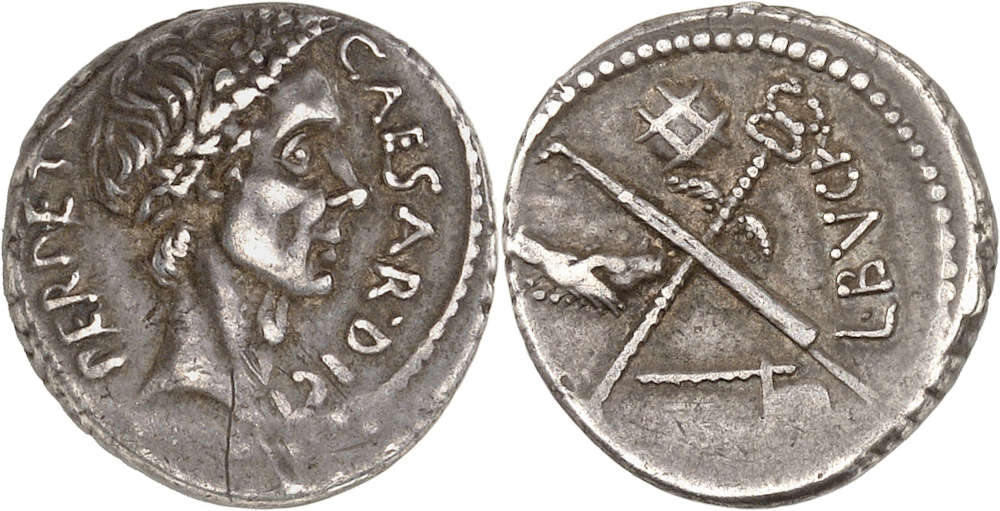
Caesar. Denarius, 44, before Caesar’s assassination. Very rare. From the collection of a lawyer. Excellent portrait. Very fine. Estimate: 2,500 euros. From Künker auction 419 (17 March 2025), No. 334.
Caesar’s Portrait
On 1 January 44 BC, Marcus Antonius took office as consul together with Caesar. At this point, the dictator seemed to have a firm grip on power. In the last days of 45 BC, the Senate had granted him the right to issue coins depicting his portrait. We owe the wonderful denarii with Caesar’s portrait to this decision. However, numismatists no longer distinguish between portraits before and after Caesar’s death, as Alföldi did. It is likely that all portrait denarii were minted BEFORE Caesar’s assassination.
The meaning of the portrait itself is also interpreted differently today. Experts emphasize the continuity that led from the depiction of dead ancestors to the portrayal of an outstanding living person. But, of course, Caesar’s enemies could also see it as an alignment with Hellenistic monarchs, especially since the Senate had appointed Caesar dictator for life in mid-February 44 BC.
A Political Assassination
The rest went down in history. Caesar fell to the daggers of his opponents on 15 March 44 BC. What is remarkable in our context is that the conspirators took great care to keep the brave and battle-hardened Marcus Antonius away from the scene. They feared that his intervention might save Caesar’s life.
Influenced by Marcus Iunius Brutus, the conspirators had only killed Caesar. They naively imagined that the removal of the “tyrant” would automatically restore the old system of mutual favors and compromise. They were wrong. Marcus Antonius took the initiative. After all, as consul he held the highest office. He took possession of the treasury, had Caesar’s widow take over Caesar’s records, and called soldiers into the city to restore order.
He also brought about an initial compromise with Caesar’s murderers: Marcus Antonius rallied some courageous senators and held an official Senate session on 17 March. All of Caesar’s laws were confirmed, thus creating legal certainty. The conspirators were granted amnesty, and it was decided to give the dictator a public funeral.
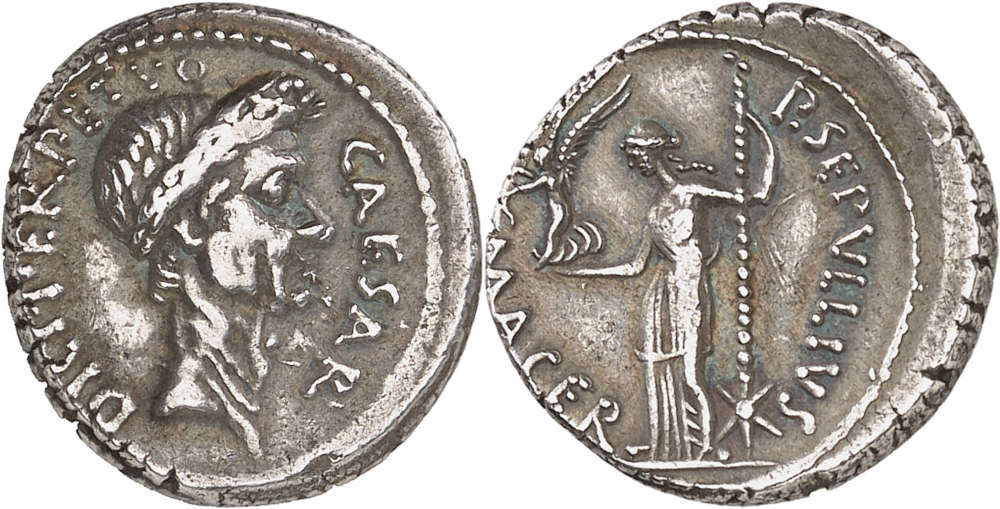
Caesar. Denarius, 44, before Caesar’s assassination. Rare. Fine toning. Very fine. Estimate: 1,000 euros. From Künker auction 419 (17 March 2025), No. 335.
We all remember the impressive speech that Shakespeare had his Marcus Antonius deliver on this occasion. It has replaced the sober words handed down by Appian in our imagination. In fact, Marcus Antonius had a reputation for powerful oratory. But he had only just calmed down the politically charged situation. Did he really use Caesar’s funeral two days later to incite the Roman people to take revenge? Was it not more likely that his speech was characterized by a genuine mourning for an admired supporter and companion? We will never know.
What we do know is that Marcus Antonius praised Caesar, even though he had known since 18 March that Caesar had not appointed Marcus Antonius but Octavianus, Caesar’s great-nephew, as his heir. The fact that he named Marcus Antonius as his secondary heir shows how close the two of them were. If anything happened to Octavianus, Marcus Antonius would take over Caesar’s inheritance. So it was no wonder that Octavianus initially allied himself with Cicero’s group.
The Provinces Foot the Bill
Nevertheless, the group around Marcus Antonius gained more and more support over the next few months. Brutus and Cassius realized that a civil war was necessary to give them the respect they felt they deserved as tyrannicides. But three things were needed to wage war: money, money, and yet more money.
Just how effectively they raised this money will bring tears to the eyes of any imaginative person. The provinces had to foot the bill. Brutus went to Macedonia. A supporter misallocated 16,000 talents – about 96 million denarii – from the treasury so that Brutus could raise an army. His 7 or 8 legions gave him control of Macedonia; and Cicero helped him to get the corresponding office. Therefore, Brutus had the right to levy taxes in his province. He did so extensively. And since the money was not enough, he went to war and plundered the treasures of rich Thrace.
Cassius did the same in Syria and Asia Minor. His scheme was the following: All the cities that had supported Dolabella, the governor that had officially been appointed by the Senate, were “punished” and had to pay contributions. The example of Tarsus illustrates what this looked like: Cassius demanded the city to pay 1,500 talents, a totally unrealistic sum. Neither public nor private funds could cover it. After melting down the precious metal in the temples, Cassius had all the citizens of the city sold into slavery. But even this was not enough to come up with 1,500 talents.
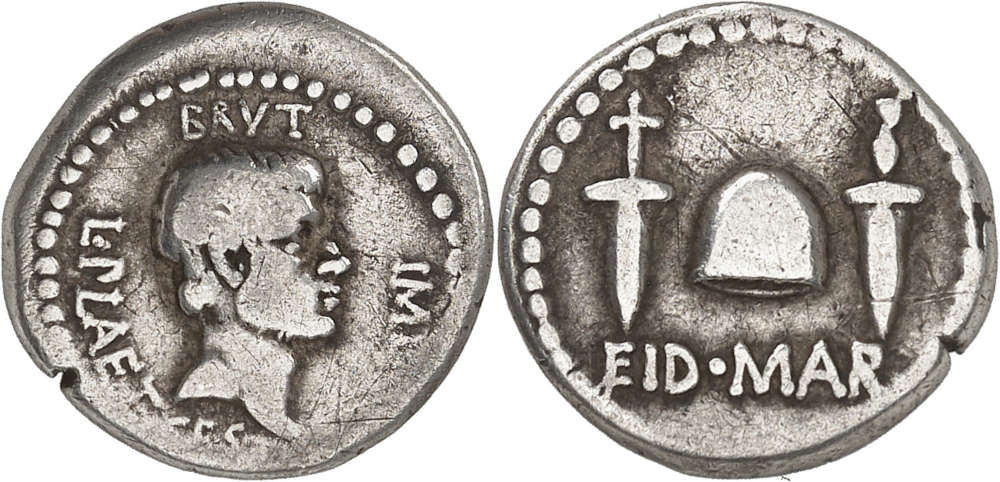
M. Iunius Brutus. Denarius, mid-42 BC, Asia Minor or Northern Greece. From a collection completed before 1990. Very rare. Fine to very fine. Estimate: 50,000 euros. From Künker auction 419 (17 March 2025), No. 337.
It is hard to imagine today how much suffering and tears are associated with the most famous coin type in world history. The dagger and the Phrygian cap on Eid Mar denarii did not represent freedom, but were proof of Brutus’ achievement. Just as Caesar had done after to the conquest of Gaul, Brutus claimed a leading role in the Roman Republic on the basis of this outstanding achievement.
Our view of the events comes from a very different context. During the 80 Years’ War (1568-1648), the Dutch used the motif of the Phrygian cap between two daggers. They interpreted this motif as a symbol of the glorious battle of the Republic against a tyrant. Thanks to the many printing presses and publishing houses that existed in the free Netherlands, they spread their version of history so effectively that intellectuals fell for the leyenda negra for centuries. The Spanish Black Legend, which made Catholic Spaniards the villains of early modern times, illustrates the extent to which fake news shape our view of history.
But let us get back to the subject of this article. In terms of chronology, this denarius takes us to the time just before the decisive battle of Philippi. Caesar’s assassins were well-funded thanks to their brutal actions. Somewhere – either still in Asia Minor or already in northern Greece – they had significant quantities of coins minted in mid-42 BC to buy the loyalty of their soldiers. Brutus paid his soldiers 1,500 denarii per man – the equivalent to approximately four years’ wages. Centurions received five times as much, legates ten times. We do not know how much this ultimately cost Brutus, but it certainly was an immense sum. His legions alone consisted of 80,000 men. In addition, there were 20,000 horsemen and auxiliaries.
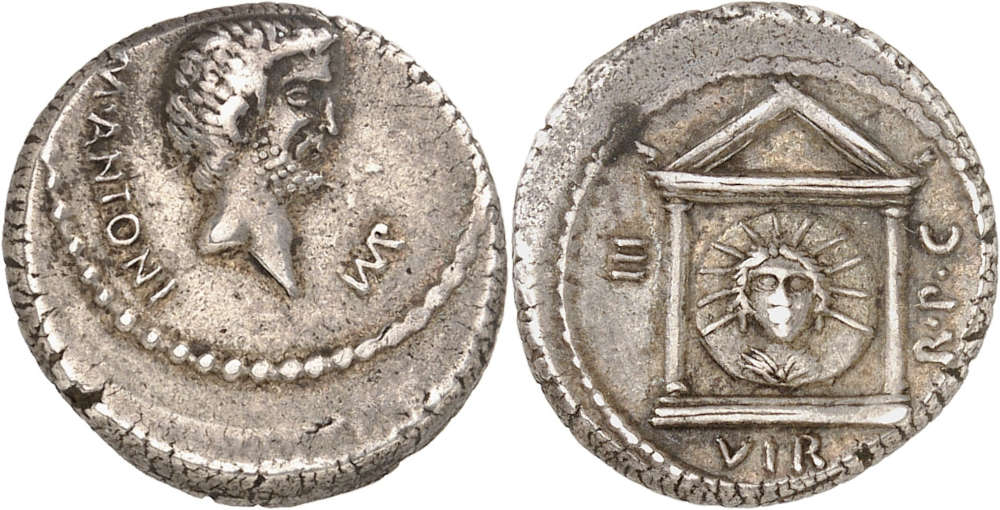
Marcus Antonius. Denarius, 42 BC, Italy. Rare. About extremely fine. Estimate: 750 euros. From auction 419 (17 March 2025), No. 339.
Proscriptions and Taxes
While Brutus and Cassius were exploiting the richest provinces of the Roman Empire, the triumvirs supplied themselves from Italy. Triumvirs? Well, Octavianus had quickly understood that, as Caesar’s heir, he did not belong on the side of his opponents, but on the side of his most loyal companions. After all, they also offered much better prospects. The result was a law passed on 27 November 43 BC by which the Assembly granted dictatorial powers to Marcus Antonius, Lepidus and Octavianus as triumviri rei publicae constituendae.
In order to restore the Republic, the triumvirs needed money. Historians have tried to interpret proscriptions – of which Cicero was one of the victims – as a money-raising measure. If this was actually the case, this measure was incredibly inefficient. A more sensible measure were the many newly introduced taxes. They culminated in the suggestion that particularly wealthy citizens should hand over their entire fortune in order to get part of it back at a later time.
Despite all these efforts, Marcus Antonius was unable to pay his soldiers a donativum before the battle of Philippi. Had the compulsory taxes raised too little money? Or were enemy ships preventing the money from crossing the Adriatic? In any case, the Caesarian soldiers had to make do with promises. And they still won the battle.

Marcus Antonius and Octavianus. Aureus, 41 BC, Ephesus. From a collection completed before 1990. Very rare. Very fine + / very fine. Estimate: 12,500 euros. From auction 419 (17 March 2025), No. 342
An Uneasy Coexistence
Marcus Antonius then moved east to prepare for the war against the Parthians. He stopped at Ephesus. There he had an extensive coin series minted, depicting his portrait on the obverse with various political allies.
In Ephesus he met all the client kings whose resources he needed to fight the Parthians. Among them was Cleopatra, his most important ally because of her incredible wealth. Her legation was equipped with all the splendor available. After all, in line with diplomatic custom, splendor reflected the importance of a ruler. Later historians – and in this tradition, Hollywood too – stylized Cleopatra’s appearance as a lascivious lack of taste that was the beginning of an amour fou. According to their version of the story, hot-blooded Marcus Antonius simply was too weak to resist the incredible sex appeal of the Oriental woman. The fact that both of them were experienced politicians through and through that depended on each other’s support is often overlooked.
While Marcus Antonius gathered his troops, Octavianus was preparing to mobilize roughly 50,000 to 60,000 soldiers. They would only be of use to him as voters and as a military reserve if he settled them near Rome in Italy. But there was little free land there. So he decided that Italian farmers had to give up their property to make room for soldiers.
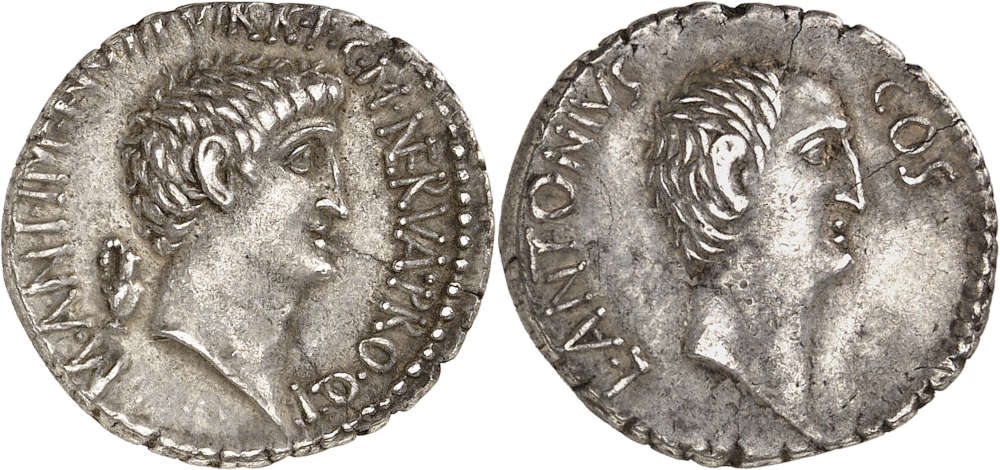
Marcus Antonius and Lucius Antonius. Denarius, 41 BC. Ephesus. Very rare. Very fine to extremely fine. Estimate: 1,250 euros. From auction 419 (17 March 2025), No. 345.
Of course, these farmers refused to do so. Lucius Antonius, acting consul and brother of Marcus Antonius, sided with them. A reason why he did so could be that he realized that his brother might be in danger in Italy if there were this many potential clients for Octavian.
It is said that 200,000 men fought over the expropriation of farmers in central Italy. Octavian was the victor, and the farmers were dispossessed. The conquest of Perusia shows how brutal the war was. The entire city council paid for their support of Lucius Antonius with their lives. Four authors recorded that Octavianus ordered 300 knights and senators to be slaughtered at the altar of Divus Iulius on the 4th anniversary of Caesar’s assassination. It may be hard to believe today, but this episode illustrates what his contemporaries thought the future “emperor of peace” was capable of.
By the way, Lucius Antonius was not punished. He became the governor of Spain. Octavian preferred not to challenge Marcus Antonius at this point. In 40 BC, the triumvirs formally divided the responsibilities of the Roman Empire between them: Marcus Antonius was given the East, Octavian the West and Lepidus Africa.

Marcus Antonius and Octavia. Aureus, 38 BC, Athens(?). From a collection completed before 1990. Extremely rare. Very fine. Estimate: 15,000 euros. From auction 419 (17 March 2025), No. 344.
The Antonine-Claudian Dynasty
Part of the agreement was a woman, Augustus’ sister. Octavia had become a widow in early 40 BC. It took a special decree of the Senate to allow her to marry Marcus Antonius before the end of the official mourning period. It was, of course, a political marriage. And that was nothing unusual in Rome. The fact that Marcus Antonius had Octavia depicted on his coinage shows just how important this marriage was for the peace of the empire. She was the second Roman woman to receive this honor. Today, we see Octavia as an exemplary and loyal wife who, even after her husband’s suicide, looked after their two daughters. With Antonia Maior and Antonia Minor, Marcus Antonius became grandfather of Emperor Claudius, great-grandfather of Emperor Caligula and great-grandfather or great-great-grandfather – once through one daughter, then through the other – of Emperor Nero. This means that the emperors of the Julio-Claudian dynasty were just as closely related to Marcus Antonius as they were to Octavianus.
The Parthians
In 37 BC, Octavianus and Marcus Antonius concluded their final deal. It stipulated that Octavianus would provide Marcus Antonius with 20,000 legionaries for the Parthian campaign. Despite the riches of the East, Marcus Antonius had a problem: he was only allowed to recruit Roman citizens for his legions. But Roman citizens lived in the West under the rule of Octavianus. As compensation, Marcus Antonius gave 120 warships to Octavianus to use against Sextus Pompeius. This was almost half the fleet with which Agrippa won the decisive victory in 36 BC. Marcus Antonius, on the other hand, waited in vain for the 20,000 legionaries he had been promised.
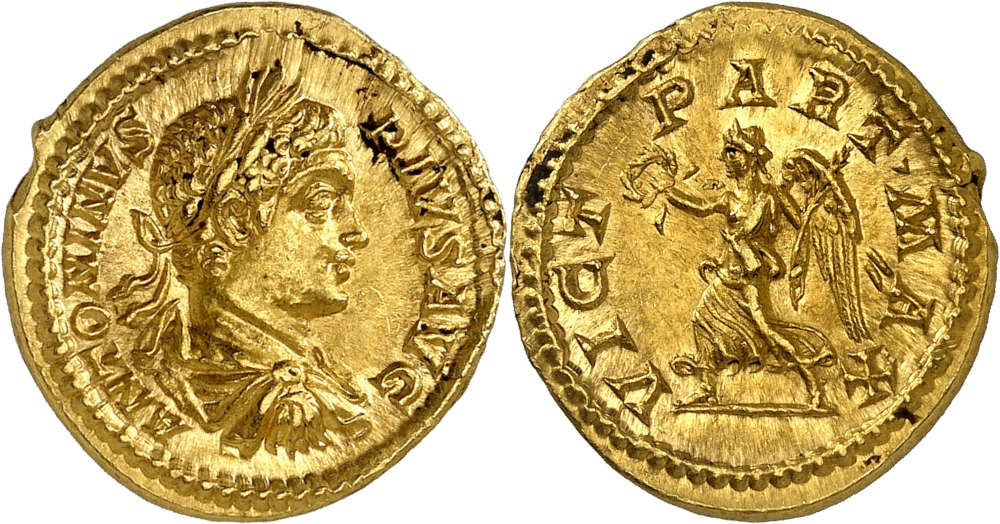
Caracalla. Aureus, 201-206, commemorating the victory over the Parthians. Very rare. About FDC. Estimate: 20,000 euros. From Künker auction 419 (17 March 2025), No. 504.
Was it the lack of soldiers that caused Marcus Antonius’ crushing defeat against the Parthians? Was it the treason of the Armenian king? Or was it the hubris of the Romans, who simply refused to believe that the Parthians were a world power on a par with Rome that would still be fighting Rome for generations to come?
In any case, Marcus Antonius returned from his campaign in 35 BC with a decimated and completely demoralized army. The fact that he even managed to withdraw his troops in a somewhat organized manner is hailed by modern historians as a strategic masterstroke. And while Marcus Antonius licked his wounds in Sidon, Octavia sent 2,000 legionaries to him on her brother’s orders. 2,000! Not the promised 20,000! After the campaign! Not as promised before!
We know how Marcus Antonius reacted to this pretense of support. He sent Octavia a letter of divorce, ending the alliance with Octavianus, and went on to marry Cleopatra, who had never hesitated to put her resources at his disposal. Marcus Antonius thus gave Octavianus carte blanche to systematically destroy his reputation in Rome. Thanks to brilliant propaganda, Caesar’s most loyal and capable supporter was turned into an oriental lecher controlled by an effeminate queen.
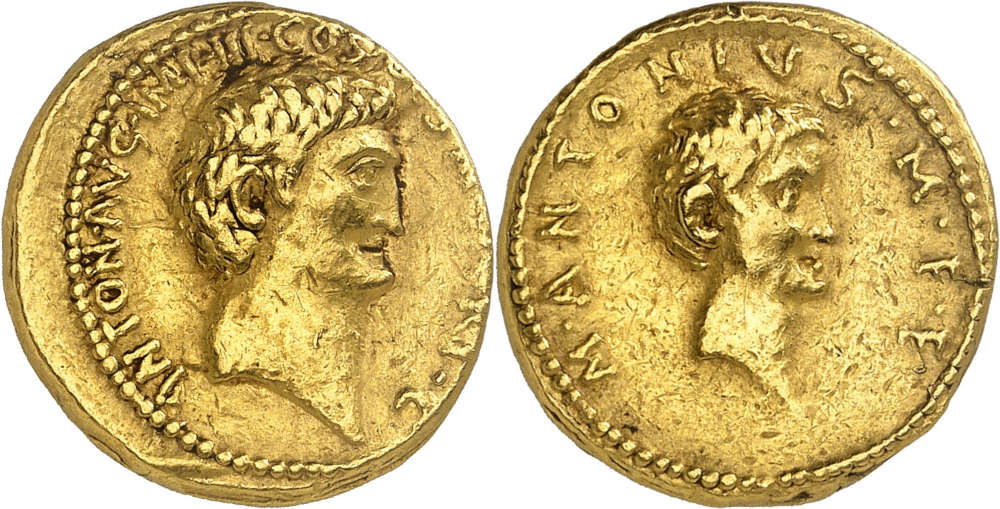
Marcus Antonius and Antyllus. Aureus, 34 BC, Syrian or Armenian mint. From MMAG auction 25 (1962), No. 586. Extremely rare. Very fine. Estimate: 30,000 euros. From Künker auction 419 (17 March 2025), No. 346
His logistical achievements show that Marcus Antonius certainly did not fit Octavianus’ description. Within a single year, he raised an army that was able to march into Armenia and punish its king for his treason. Marcus Antonius celebrated this victory with a great feast in Alexandria. Octavianus declared this a scandal: he said that Marcus Antonius had celebrated a triumph without paying homage to Iuppiter Optimus Maximus, without consulting the Senate (and without distributing the usual gifts to Roman citizens). Historians now believe that Marcus Antonius did follow the rules and entered Alexandria not as a triumphator but as new Dionysus. But nobody in Rome would care about that.
In the year of this victory, an aureus was minted in a Syrian or Armenian mint, showing the portrait of Marcus Antonius together with that of his son Antyllus. Antyllus, who was actually engaged to Julia, Octavianus’ daughter, came to the East after the break between Octavianus and Marcus Antonius. He only lived to the age of 17. Octavianus had him executed after his victory – just like Caesar’s only biological son, Caesarion, who was about the same age.
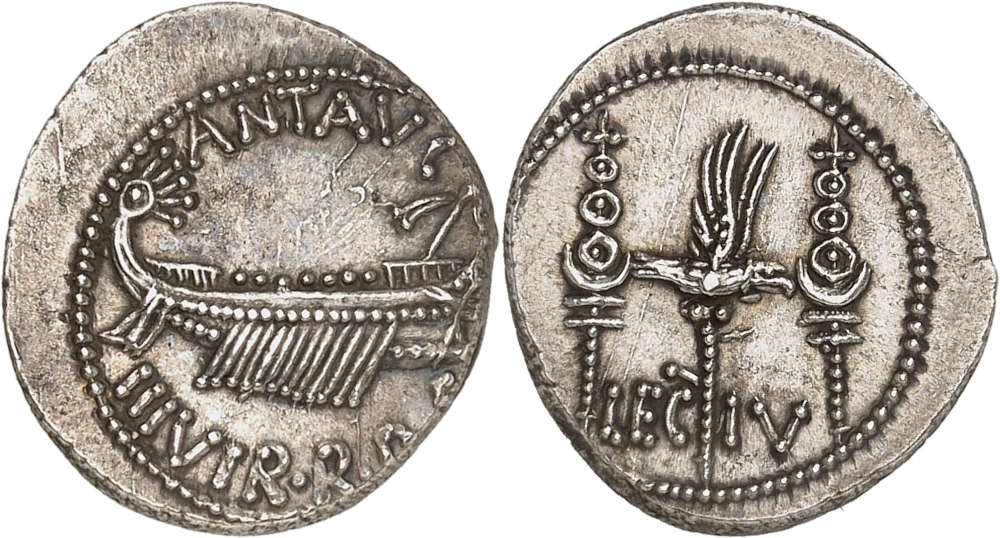
Marcus Antonius. Legion denarius, 32/31, Patras(?). Extremely fine. Estimate: 400 euros. From Künker auction 419 (17 March 2025), No. 340.
The Final Battle
This brings us to the final battle for power. Octavianus proudly wrote in his account of deeds that the whole of Italy had freely sworn allegiance to him, and had expressly demanded him as their leader in battle. Well, Marcus Antonius still had so many supporters in Rome at this point that 300 senators – about a third of the Senate – took advantage of the promise of free passage to join Marcus Antonius in the East.
We all know the outcome of the Battle of Actium. Marcus Antonius’ retreat with the Egyptian fleet had the effect of a rout on his legionaries. They felt abandoned and defected in droves to Octavianus. The war was over, and it was only a matter of time before Alexandria would be conquered.
The rest became a myth: Marcus Antonius threw himself on his sword, Cleopatra killed herself with a snakebite. Augustus had them buried side by side. Not because he was moved by the lovers’ fate, but because it suited his own version of history: the Roman Marcus Antonius had become an Egyptian. So why would anybody care about the fact that Octavianus’ betrayal had left Marcus Antonius no other option?
Bibliography
- Hermann Bengtson, Marcus Antonius. Triumvir und Herrscher des Ostens. Munich (1977)
- Bernhard Woytek, Arma et Nummi. Forschungen zur römischen Finanzgeschichte und Münzprägung der Jahre 49 bis 42 v. Chr. Wien (2003)







